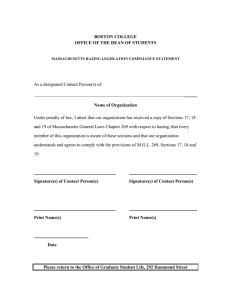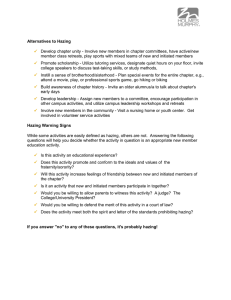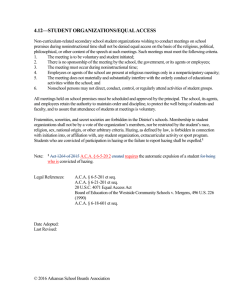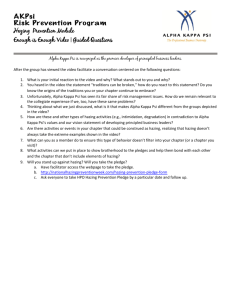University Policy: Hazing Policy Category: Subject:
advertisement
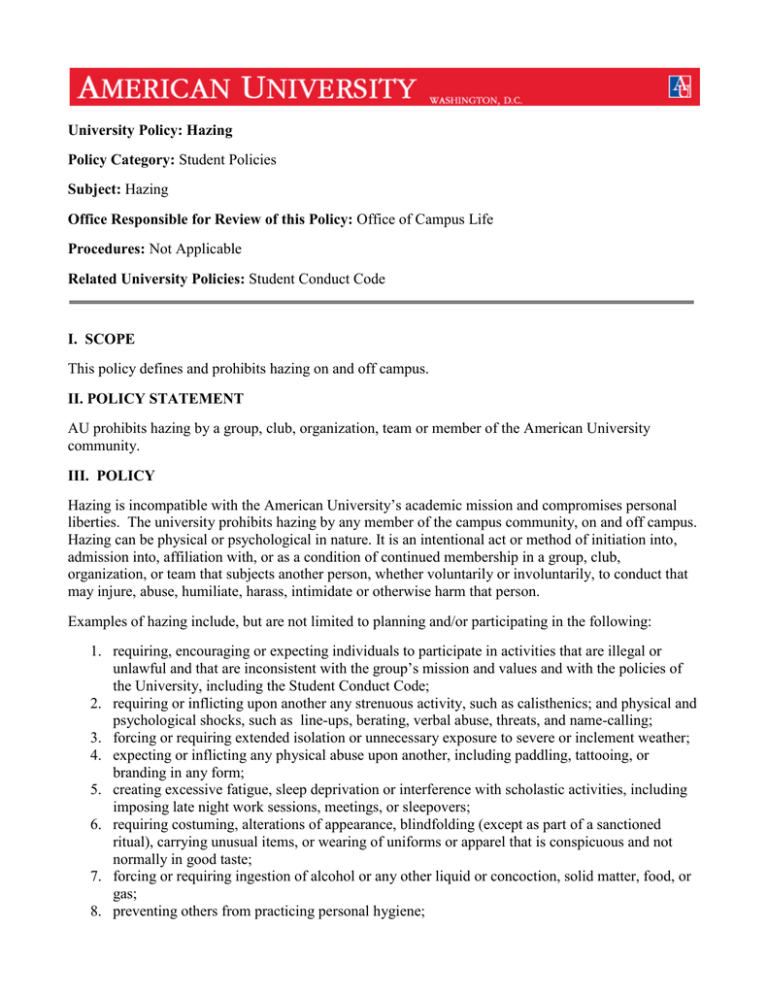
University Policy: Hazing Policy Category: Student Policies Subject: Hazing Office Responsible for Review of this Policy: Office of Campus Life Procedures: Not Applicable Related University Policies: Student Conduct Code I. SCOPE This policy defines and prohibits hazing on and off campus. II. POLICY STATEMENT AU prohibits hazing by a group, club, organization, team or member of the American University community. III. POLICY Hazing is incompatible with the American University’s academic mission and compromises personal liberties. The university prohibits hazing by any member of the campus community, on and off campus. Hazing can be physical or psychological in nature. It is an intentional act or method of initiation into, admission into, affiliation with, or as a condition of continued membership in a group, club, organization, or team that subjects another person, whether voluntarily or involuntarily, to conduct that may injure, abuse, humiliate, harass, intimidate or otherwise harm that person. Examples of hazing include, but are not limited to planning and/or participating in the following: 1. requiring, encouraging or expecting individuals to participate in activities that are illegal or unlawful and that are inconsistent with the group’s mission and values and with the policies of the University, including the Student Conduct Code; 2. requiring or inflicting upon another any strenuous activity, such as calisthenics; and physical and psychological shocks, such as line-ups, berating, verbal abuse, threats, and name-calling; 3. forcing or requiring extended isolation or unnecessary exposure to severe or inclement weather; 4. expecting or inflicting any physical abuse upon another, including paddling, tattooing, or branding in any form; 5. creating excessive fatigue, sleep deprivation or interference with scholastic activities, including imposing late night work sessions, meetings, or sleepovers; 6. requiring costuming, alterations of appearance, blindfolding (except as part of a sanctioned ritual), carrying unusual items, or wearing of uniforms or apparel that is conspicuous and not normally in good taste; 7. forcing or requiring ingestion of alcohol or any other liquid or concoction, solid matter, food, or gas; 8. preventing others from practicing personal hygiene; 9. withholding information or personal property from others that is essential to daily functioning (e.g. wallets, keys, swipe cards, money, phones, computers, or any other personal property); 10. requiring others to perform errands, provide entertainment, use personal funds to purchase any item for another person or to pay for organizational activities (outside of regular membership dues and assessments), or to engage in any activities that a reasonable person would find degrading or personally objectionable; 11. transporting others against their will; 12. conducting quests or hunts, whether or not such activities endanger participants or require them to damage, remove, or steal property; 13. addressing, interrogating, or deceiving others in a manner that may psychologically injure, abuse, humiliate, harass or intimidate them; 14. restricting normal daily activity on campus (e.g. requiring people to be silent or isolating themselves, not allowing them to be in certain parts of campus, or not allowing them to talk to friends, roommates, family members, etc.); 15. Misleading an individual or individuals into believing that they will be inducted or initiated by participating in particular activities. Exclusion of a specific example should not be interpreted as indicating that the excluded conduct is acceptable or permissible. Members of the University community are expected to report hazing or suspected hazing activities as soon as possible and to cooperate with University officials who investigate reports. If a charge of hazing is brought, the individual, group, club, organization, or team will be subject to the disciplinary procedures outlined in the Student Conduct Code. Law enforcement agencies off campus also may be notified. Advisors to clubs, organizations, or teams and their national or international officials may be notified in cases of alleged violations of this policy. Disciplinary action taken by a club, organization, or team or by its national or international officials will not preclude University action. Conduct Council sanctions for individuals found responsible for hazing may include suspension or dismissal from the University. Sanctions for group or organization misconduct may include revocation or denial of registration or recognition, as well as other appropriate sanctions. Sanctions for misconduct by a group with provisional recognition may include denial of recognition, as well as other appropriate sanctions. IV. REPORTING To report incidents of hazing or suspected hazing and to obtain further information about this policy and reporting procedures, contact the Office of the Dean of Students (202-885-3300, Butler 408) or Public Safety (202-885-2527, Public Safety Building). Reports also may be submitted using the reporting form on the Dean of Students Web page: www.american.edu/ocl/dos IV. EFFECTIVE DATE(S) This policy was effective April 2000 and last reviewed in October 2015.
